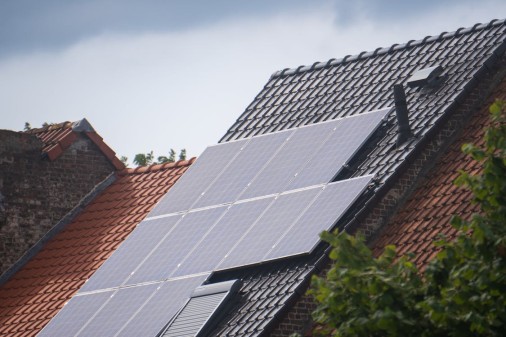Here’s How To Add Solar Panels to Camper / RV
As a camper or an RV owner, you may have asked yourself: Can solar panels power my RV? The short answer: They abso-effin’-lutely can!
2025 is around the corner, and one of your best paths to energy independence with your RV is adding solar panels. Whether you are going off-grid camping, or just want to reduce your dependence on the traditional electrical grid, solar panels can be a source of sustainable energy that is both clean and renewable for whatever your needs may be.
In this comprehensive article, you will learn everything about installing solar panels for your RV. That is why we will go over what solar power means, how it functions, and working your way to choose a system for your RV, besides learning step-by-step the installation process of one; these are the main topics that this article aims to give you an insight about adding a solar panel to the camperThe
Table of Contents
- Add Panels on Camper / RV
- Solar RV Energy Basics
- Camper / RV Solar Panels - Installation
- Why Solar Power for RVs?
- Choose The Right Solar Panels for Your RV
- Power Requirements of a Solar RV System
- RV/ Camper Solar System - Components
- RV/ Camper Solar Panels - Cost
- RV Solar System - Upkeep & Maintenance
- Advantages of Solar RV System
- Camper / RV Solar - Disadvantages
- Final Thoughts
- FAQs
Add Solar Panels to Camper | A Comprehensive Guide
Solar RV Energy Basics
How do Solar Panels normally Work ?
Solar panels use energy from sunlight and thus turn it into electricity. A solar panel thus captures sunlight and the photovoltaic (PV) cells within which it creates a direct current (DC) electrical energy. As DC power is used to charge batteries and run low-voltage items in your coach, you must convert this current into usable AC (alternating current) for RV appliances so an INVERTER comes into play.
How to Install Solar Panels in Camper / RV?
1. Planning Your Solar Setup
First, plan out how much power your RV will require and what you can fit onto the roof. This will serve to determine how many panels you can fit & the kind of power it generates.
2. Installing Solar Panels
Your solar panels must be mounted on the roof of your RV, this way they will catch as much sun power directly. Tilt mounts are another option popular among some RV owners… they angle the panels to take maximum advantage of the sun.
3. How to wire up the charge controller and batteries
Your solar panels will be quite far away from your batteries, so the charge controller needs to go in between them as close to your battery bank as possible,… Hook up the solar panels to a charge controller and then hook that into your RV’s batteries.
4. Setting Up the Inverter
Install The Inverter to check for electricity and power in the solar panel.
5. Wiring and Testing
Once everything is installed properly, Then double-check for the wiring connections to ensure that they are safe and secure. Then test the system properly to make sure it is working correctly and is highly efficient.
To understand what all of these actually translates into, in practical terms, you need to have a thorough idea about what each step comprises of . For this, you need a detailed information on every aspect of installation process, wich is present below:
Why Solar Power for RVs?
Reach + Flexibility + Green Power: This in my opinion is one of the best alternatives we have as vanlifers, simply because it gives us a much broader reach than plugging to shore power. Solar is quiet, zero-emission, and environmentally friendly plus you are now stand-alone even without access to the grid.
True, solar-powered RVs make economic sense in the long term.
BUT —
It may be years before the system has paid for itself despite the cheap power for the energy cost of your solar power.
Therefore :
Choosing the Right Solar Panels for Your RV is SUPER important
Types of Solar Panels for Camper / RVs
Monocrystalline-based Solar Panels — It is one of The most efficient and long-lasting solar panels, which are not that suitable for low-temperature conditions This is a good option for RVs that have a small roof footprint because they generate more watts per square foot.
Polycrystalline panels (less efficient than monocrystalline, but cheaper) Well that translates to more power and needs lots of space for it.
Flexible Panels– They are lightweight and flexible so they can be fit to the curved surface like an RV roof. Though they may not be long-term or as efficient, flexible panels do have their merits. In our opinion, the best type of solar panels for camper/RV.
Wanna check out the Top 10 Flexible Solar Panels for your RV/ camper? Head over to the article below:
10 best flexible solar panels for RV
Power Requirements of a Solar RV System
You will also have to consider power so here is a list of what that entails:
Start with estimating your daily energy intake to know how much solar power you require. Write down a listing of the entire home equipment and units of your RV you use—that means all lights, refrigerators, fans, and electronics. Find out how many hours each device runs in a day and its wattage. This can give a rough estimate of the amount of energy (in watt-hours) that your solar system should produce.
If your RV requires 2,000 watt-hours of power per day and that size solar system can generate a maximum of only 1,400 watt-hours each day to charge the battery with what you need will be limited.
Components of RV/ Camper Solar Power System
There are a few main components to a full RV solar setup:
• Photovoltaic Solar Panels -Generate electricity from the sunlight.
• Charge Controler: To Regulate the Panel voltage So that Your battery is stopped overcharged. There are two main types:
1. PWM (Pulse Width Modulation): Cheaper but less efficient.
2. MPPT (Maximum Power Point Tracking) – more efficient, especially in low-light conditions but also pricier.
• Inverter – You will need an inverter to transfer the solar panels and batteries’ DC power into AC which can be utilized by most RV appliances.
• Batteries — Stores spare energy from your solar panels. There are great battery types that you can choose from, they include;
1. Affordable, Heavy, and Maintenance Every Month. Lead-Acid Battery
2. Lithium-Ion Batteries: They may be pricier but they’re lighter, last longer, and are faster.
Cost of Solar Panels for an RV/ Camper
Solar panel price: You can install many solar panels on your RV depending on the size and type of system you choose.
A Rough Breakdown:
Small Systems 100-200W: $500 – $1,000 (lights and phone charging)
Medium Systems (200-400W): $1,000 — $3,000 (appliances: refrigerators and fans).
Average : $3,000 – 10,00+ Including installation Small Systems (100W to <400 W)
Large systems Battery storage for overnight use #above kits +$5k On cabins or homes that need more than small lights and charging units.
RV Solar System – Upkeep & Maintenance
While solar panels are generally maintenance-free, below lists some things you can do to keep them running efficiently.
• Keep the Panels Clean: dirt and debris can decrease their performance. When cleaning the panels make sure to use water and a soft brush
• Wiring Connections: Examine wiring connections regularly to ensure that they are tight and free of corrosion.
• For maintaining batteries—water for lead-acids and terminals cleaning
Advantages of Solar RV System
1. Energy Independence
One of the ways you can save on energy use is to add solar panels that may eliminate your need for campground hookups or running a noisy fuel-guzzling generator. You will do nothing however Sweat the so-called Solar energy helps you to have all your home appliances working even if there is no outside electrical power.
2. Eco-Friendly Solution
They have a smaller carbon footprint than solar panels. They do not emit harmful pollutants the way that generators are known to. Since this power is based on a renewable source, it’s sustainable and not burning fossil fuels.
3. Reduced Operating Costs – A Self explanatory point.
Disadvantages of RV Solar Power
1. Weather Dependence – Since solar panels rely on sunlight. They generate less power when not in full sun (shade or clouds). If you are in this situation, you might need to tap into your battery backup or run a generator.
2. Initial Cost – The cost of the Solar System for RVOwnership costs be high, sometimes even comparable to down payments on brand new rigs if you go with premium components. This is an investment that may require a little more upfront than other approaches but saves on fuel and electric costs over time.
3. Limited Roof Space – You can only produce as much energy on your RV as there is roof space available. Your panels may need to be supplemented with additional panels or an electrical source like a portable generator if your energy needs are higher.
Final Thoughts
In 2025 investing in solar panels for your camper or RV is a no-brainer if you want energy independence, ecological power, and silent electricity when on the move. Regardless of if you are a weekend camper or full-time RVer, solar power can be an effective way to free yourself from conventional, hook-ups and allow more freedom out on the open road.
Before you dive in and splurge your cash on solar systems for RV, evaluate how much power juice you need then research the most suitable solar solution that suits all your energy needs without sacrificing too much money to keep them running again.
At the end of it all:
So long as the straw
To tap the sap of the sun
Has been well set,Your bright days shall meet
Your years well spent.
Frequently Asked Questions
In terms of energy efficiency, solar panels are better than solar shingles. In terms of appearance, solar shingles have an edge over solar panels with their sleek and sophisticated look.
Solar panels and Shingles can last 25-30 years. However, it varies from company to company .
A solar shingle, also known as solar roof tiles, are composed of semiconducting material and work to harness solar energy and convert it into electricity. It is an advanced roofing solution.
A solar panel is made up of solar cells, which are typically monocrystalline or polycrystalline, whereas solar tiles are made of Copper Indium Gallium Selenide. The function of solar panels is energy production, whereas solar tiles were designed to be an alternative roofing option while producing electricity.






